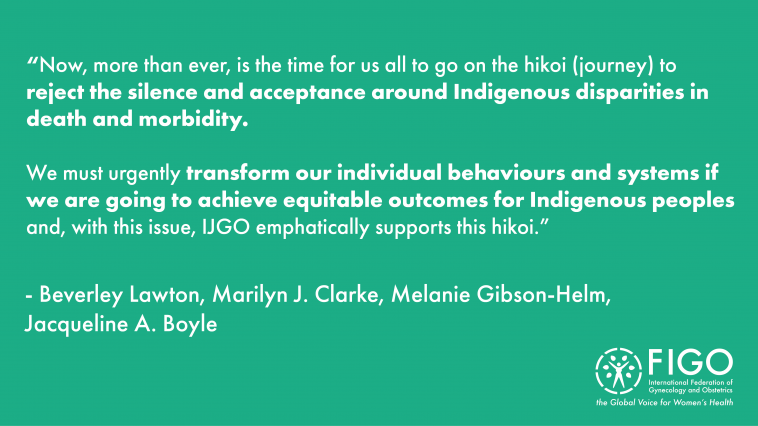IJGO publishes A Call for Action in Indigenous and First Nations Women’s Health and Wellbeing
IJGO is delighted to announce the publication of A Call for Action in Indigenous and First Nations Women’s Health and Wellbeing.

In October 2021, the International Journal of Gynecology & Obstetrics (IJGO) published a highly exciting and urgent special issue, titled: A Call for Action in Indigenous and First Nations Women’s Health and Wellbeing.
This special issue contains 16 articles broadly focusing on reproductive health and high-quality systems of care that respect the traditions and practices of First Nations and Indigenous peoples. It contains original research, led by or in partnership with Indigenous and First Nations people and their communities, and reviews aimed at highlighting knowledge gaps, actions that improve systems, and culturally appropriate care.
The entire special issue is FREE to read for a promotional period of 3 months.
Now, more than ever, is the time for us all to go on the hikoi (journey) to reject the silence and acceptance around Indigenous disparities in death and morbidity.
We must urgently transform our individual behaviours and systems if we are going to achieve equitable outcomes for Indigenous peoples and, with this issue, IJGO emphatically supports this hikoi.
- Beverley Lawton, Marilyn J. Clarke, Melanie Gibson-Helm, Jacqueline A. Boyle
This special issue on Indigenous and First Nations populations is a call to action for everyone who works in women's health, and a call to listen to the voices of Indigenous women, researchers, and clinicians. This special issue brings together strengths-based research which presents voices and actions that can be heard and taken forward in order to make a difference. The issue highlights the voices of those usually not heard in research, in clinical care, and in health service design, and calls out the silence and invisibility commonly imposed on Indigenous women.
Read the Special Issue: A Call for Action in Indigenous and First Nations Women’s Health and Wellbeing
The articles in IJGO’s Call for Action in Indigenous and First Nations Women’s Health and Wellbeing are as follows:
- Disconnected perspectives: Patient and care provider's experiences of substance use in pregnancy
- Improving systems of prenatal and postpartum care for hyperglycemia in pregnancy: A process evaluation
- Reducing risk for gestational diabetes among American Indian and Alaska Native teenagers: Tribal leaders' recommendations
- Satisfaction of Quechua-speaking indigenous pregnant women from a rural community in Peru with telemonitoring during the COVID-19 pandemic
- On the path to reclaiming Indigenous midwifery: Co-creating the Maternal Infant Support Worker pilot program
- Highlighting strengths and resources that increase ownership of cervical cancer screening for Indigenous communities in Northern British Columbia: Community-driven approaches
- An environmental scan of impacts and interventions for women with methamphetamine use in pregnancy and their children
- He Tamariki Kokoti Tau: Tackling preterm incidence and outcomes of preterm births by ethnicity in Aotearoa New Zealand 2010–2014
- Standing up for your birth rights: An intersectional comparison of obstetric violence and birth positions between Quichua and Egyptian women
- A better start to life: Risk factors for, and prevention of, preterm birth in Australian First Nations women – A narrative review
- A silent burden—prolapse, incontinence, and infertility in Australian Aboriginal and Torres Strait Islander women: A systematic search and narrative review
- He Tapu Te Whare Tangata (sacred house of humanity): Under-screened Māori women talk about HPV self-testing cervical screening clinical pathways
- Perspectives about smoking cessation during pregnancy and beyond of Aboriginal women in Australia: A qualitative analysis using the COM-B model
- Postpartum hemorrhage: Moving from response to prevention for Alaska Native mothers
- Gestational diabetes is associated with postpartum hemorrhage in Indigenous Australian women in the PANDORA study: A prospective cohort
- Pēpē-infant sleep practices and sudden unexpected death in infancy in Aotearoa New Zealand